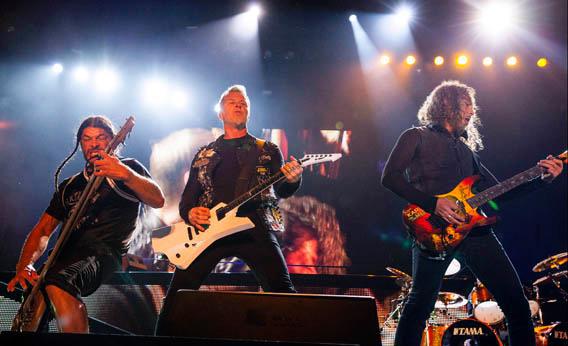The light in his eyes, his rapt stage-ward gaze, tells you everything. High in the thundering tiers of a Canadian hockey rink, the young metalhead is serenely out of his mind. Surrounded by nutters, he is still: He yells not, neither does he fist-pump. Decibels clang, adrenaline torches the air, but this kid has entered the deep and resonant chamber of metallic peace, where the inner pressure is matched (at last) by the outer, the mind-noise dissolved into the world-noise, and 15,000 Québécois are bellowing O-BEY! YOUR! MAS-TURRR!!
Quebec Magnetic is a very potent DVD that gathers two Metallica shows at Quebec City’s Colisée Pepsi into one live document. Late 2009: Metallica in its metallimaturity, 27 years after Kill ’Em All. James Hetfield, voice/rhythm guitar, is still a figure of swaggering command, roaring his summons to the crowd. “Quebec are you ALIVE? … How does it feel to be ALIVE? SHOW ME!!!” Manifest yourselves, fuckers! BE! Hetfield’s goatee is gray and there is middle-aged perspiration in his acne craters. His piggy little rager’s eyes have turned kindly. “Are you still out there? Are you feeling BETTER?” Drummer Lars Ulrich is still the irrepressible spazz of yore, bouncing and grimacing and sticking his tongue out, his head now shaped like one of the tennis balls he used to knock about in his sporty Danish youth. Lead guitarist Kirk Hammett nods and gently sways and takes those windy metallic strolls of his, tilting across the stage while staring awestruck at his own fretboard.
And then there’s bassist Robert Trujillo, who joined the band in 2003 after the exit of Jason Newsted. Humped and prowling, glistening with physicality, Trujillo—it becomes quite clear as you watch Quebec Magnetic—is vital to late-period Metallica. He gives the band essence. Very handsome in a rope-haired, rock-monstrous way, he has also figured out (no mean thing) how to play with Lars Ulrich, how to creepy-crawl his bass lines into the pockets of Ulrich’s hiccuping anti-style. James Hetfield has always been the band’s timekeeper, anyway, downstroking it, quartering the meter on the chopping block of his Flying V, but now the bottom end is steadier, feels fuller. As the finale of “Sad But True” decays through the rear echelons of the stadium, Trujillo indulges in a brief, violent bass solo/downtuning session, crouched bestially over his instrument and thrumming the loosened strings. SPRWANGG! FDUNGGGG! Low roars from the crowd, and dilations of the spirit.
Old stuff, newer stuff. “That Was Just Your Life” is the first song on the DVD, a devastating slice of Hetfield-think from 2008’s Death Magnetic, his hymn to the backwardness of existence. “I blind my eyes, I hide and feel it passing me by/ I open just in time to say goodbye …” They muff it, unfortunately, come out of the traps too excited and play it too fast. But even as we lament Hetfield’s rushing through his superb lyrics, let us commend these veterans for their amateurish impetuousness, their revved-upness. The material from Death Magnetic sounds pretty good here, by and large. Fiddlier-seeming and more laborious than anything since … And Justice for All, it does have some splendidly, straightforwardly chunky moments. “Suicide!” barks Hetfield on “Cyanide,” through a black grille of guitar-chug. “I’ve already died! You’re just the funeral I’ve been waiting for!”
But it’s the classics, of course, that get the job done, that achieve the carnivalesque moments of mass release. “Master of Puppets,” “Sad But True,” “For Whom the Bell Tolls” … The stadium’s basin happily shakes. Hetfield’s phrasings are now so worn with use, as he sings the big numbers, they resemble the strange elisions and half-yodels of a street vendor. (“Pain monopoly/ Ritual misery,” for example, from “Master of Puppets” has become Pin mana-puh-lay/ Ruh-ruh-rit-choo miser-AY!) His few strokes of theater are crudely effective. Just leave me aluuuuurn, he growls in “Welcome Home (Sanitarium),” twirling a finger next to his right temple, semaphoring bonkers-ness, and one is reminded why Metallica is huge and will always be huge. Because with songs like this—a rattling-the-bars anthem for the psychiatrically confined—they restated the metal gospel with more clarity and inclusivity, more heart, than any of their peers. “Bring me your lunatics,” it says, “your addicts, your broken soldiers and your shattered men, bring me the victims of this fallen world and by the electricity invested in me I will empower them.” It never goes out of style.
